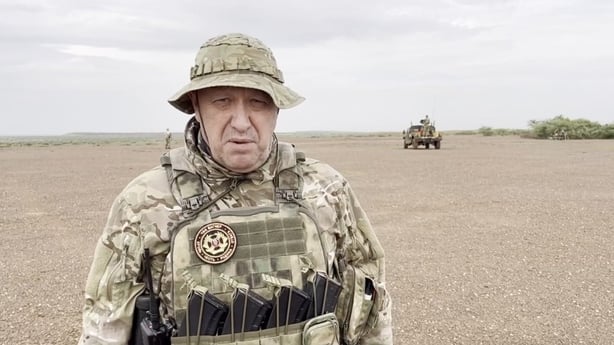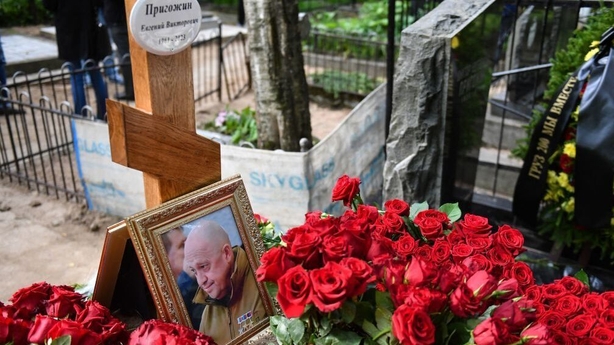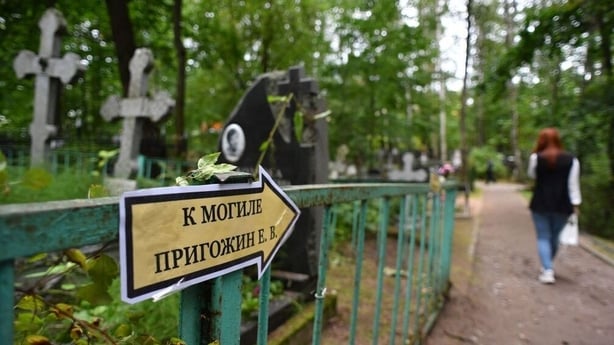Followers of mutinous Russian mercenary Yevgeny Prigozhin have laid flowers, messages and poetry at his grave, hailing him as a fearless warrior after he died along with his inner circle in a yet-to-be-explained plane crash.
Prigozhin was buried at Porokhovskoye cemetery in his home city of St Petersburg yesterday away from the glare of the publicity he had courted so ardently in life, after leading his fighters towards Moscow before turning back.
A man wearing the shirt of his Wagner mercenaries and a cap bearing the Russian flag was among those paying respects at the grave, where red roses and carnations graced a wooden Orthodox cross labelled "Prigozhin, Yevgeny Viktorovich 1961 - 2023".
One tribute beside flowers read: "To be a warrior is to live forever."
"It is a big loss for Russia," said Sergei Abeltsev, a former Russian lawmaker, who visited the grave.
"We will feel that loss only later - as always - the realisation of the loss will only come later."
The private jet on which Prigozhin was travelling to St Petersburg from Moscow crashed north of the Russian capital on 23 August killing all ten people on board, including Prigozhin, top Wagner commanders, his bodyguards and a crew of three.
The cause is still unclear, but villagers near the scene said they heard a bang and then saw the plane plummet to the ground.

It crashed exactly two months after Prigozhin took control of the southern city of Rostov in late June, the opening salvo of a mutiny that shook the foundations of President Vladimir Putin's Russia.
In life, Prigozhin liked to say that he was one of the world's most feared mercenaries with the best fighting force.
Opponents such as the United State cast him as a brutal commander who plundered African states and took brutal revenge on those who crossed him.
Though he won the bloodiest battle yet of the Ukraine war for President Putin by capturing Bakhmut, Prigozhin became enraged with what he said were the treacherous failings of the Russian military - and warned that Moscow could lose the entire Ukraine war.
After months of insulting Mr Putin's top brass with a variety of expletives and prison slang over their perceived failures, Prigozhin marched towards Moscow before turning back 200km from the capital.
He said that he simply wanted to settle scores with Defence Minister Sergei Shoigu and Chief of the General Staff Valery Gerasimov, though he also dissected the very justification behind the Ukraine war.

President Putin initially cast Prigozhin as a traitor whose mutiny could have tipped Russia into civil war, though he later did a deal with him to defuse the crisis.
The day after the crash, Mr Putin sent his condolences to the families of those killed and said he had known Prigozhin for a very long time, since the chaotic years of the early 1990s.
"He was a man with a difficult fate, and he made serious mistakes in life," the president said, while describing him as a talented businessman.
Before the mutiny, Prigozhin had quipped that his nickname should have been "Putin's butcher" rather than "Putin's chef" - a moniker acquired after his catering company won Kremlin contracts.
He said he always professed loyalty to Mr Putin, while describing Mr Shoigu as so incompetent that he should executed for his treachery. Mr Shoigu has not responded in public to those insults.

The Kremlin has rejected as an "absolute lie" the suggestion by some Western politicians and commentators - for which they have not provided evidence - that President Putin ordered Prigozhin to be killed in revenge.
US President Joe Biden said he was not surprised by the death and that not much happened in Russia that Mr Putin was not behind.
After Prigozhin's death, President Putin ordered Wagner fighters to sign an oath of allegiance to the Russian state - a step that Prigozhin had opposed due to his anger at the defence ministry that he said risked losing the Ukraine war.
A picture of Prigozhin frowning and the text of Joseph Brodsky's "Nature Morte" lay on the freshly dug ground of his grave.
"You are nailed to the cross. How will I go home?" the excerpt of the poem said. "Dead or alive - there are no differences."

